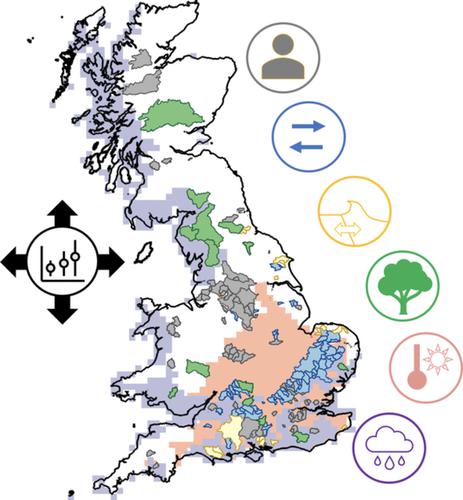当前位置:
X-MOL 学术
›
Hydrol. Process.
›
论文详情
Our official English website, www.x-mol.net, welcomes your feedback! (Note: you will need to create a separate account there.)
Knowledge gaps in our perceptual model of Great Britain's hydrology
Hydrological Processes ( IF 3.2 ) Pub Date : 2021-06-28 , DOI: 10.1002/hyp.14288 Thorsten Wagener 1, 2, 3 , Simon J. Dadson 4, 5 , David M. Hannah 6 , Gemma Coxon 2, 7 , Keith Beven 8 , John P. Bloomfield 9 , Wouter Buytaert 10 , Hannah Cloke 11, 12, 13, 14 , Paul Bates 2, 7 , Joseph Holden 15 , Louise Parry 16 , Rob Lamb 8, 17 , Nick A. Chappell 8 , Matthew Fry 5 , Gareth Old 5
Hydrological Processes ( IF 3.2 ) Pub Date : 2021-06-28 , DOI: 10.1002/hyp.14288 Thorsten Wagener 1, 2, 3 , Simon J. Dadson 4, 5 , David M. Hannah 6 , Gemma Coxon 2, 7 , Keith Beven 8 , John P. Bloomfield 9 , Wouter Buytaert 10 , Hannah Cloke 11, 12, 13, 14 , Paul Bates 2, 7 , Joseph Holden 15 , Louise Parry 16 , Rob Lamb 8, 17 , Nick A. Chappell 8 , Matthew Fry 5 , Gareth Old 5
Affiliation

|
There is a no lack of significant open questions in the field of hydrology. How will hydrological connectivity between freshwater bodies be altered by future human alterations to the hydrological cycle? Where does water go when it rains? Or what is the future space–time variability of flood and drought events? However, the answers to these questions will vary with location due to the specific and often poorly understood local boundary conditions and system properties that control the functional behaviour of a catchment or any other hydrologic control volume. We suggest that an open, shared and evolving perceptual model of a region's hydrology is critical to tailor our science questions, as it would be for any other study domain from the plot to the continental scale. In this opinion piece, we begin to discuss the elements of and point out some knowledge gaps in the perceptual model of the terrestrial water cycle of Great Britain. We discuss six major knowledge gaps and propose four key ways to reduce them. While the specific knowledge gaps in our perceptual model do not necessarily transfer to other places, we believe that the development of such perceptual models should be at the core of the debate for all hydrologic communities, and we encourage others to have a similar debate for their hydrologic domain.
中文翻译:

英国水文感知模型中的知识缺口
水文学领域不乏重要的开放性问题。未来人类对水文循环的改变将如何改变淡水水体之间的水文连通性?下雨时水去哪儿了?或者洪水和干旱事件的未来时空变化是什么?然而,由于控制集水区或任何其他水文控制体积的功能行为的特定且通常知之甚少的局部边界条件和系统特性,这些问题的答案将因位置而异。我们建议,一个区域水文的开放、共享和不断发展的感知模型对于定制我们的科学问题至关重要,就像从地块到大陆尺度的任何其他研究领域一样。在这篇评论文章中,我们开始讨论英国陆地水循环感知模型的要素并指出一些知识空白。我们讨论了六个主要的知识差距,并提出了四种减少它们的关键方法。虽然我们感知模型中的特定知识差距不一定会转移到其他地方,但我们认为这种感知模型的发展应该是所有水文社区辩论的核心,我们鼓励其他人就他们的问题进行类似的辩论。水文领域。
更新日期:2021-07-13
中文翻译:

英国水文感知模型中的知识缺口
水文学领域不乏重要的开放性问题。未来人类对水文循环的改变将如何改变淡水水体之间的水文连通性?下雨时水去哪儿了?或者洪水和干旱事件的未来时空变化是什么?然而,由于控制集水区或任何其他水文控制体积的功能行为的特定且通常知之甚少的局部边界条件和系统特性,这些问题的答案将因位置而异。我们建议,一个区域水文的开放、共享和不断发展的感知模型对于定制我们的科学问题至关重要,就像从地块到大陆尺度的任何其他研究领域一样。在这篇评论文章中,我们开始讨论英国陆地水循环感知模型的要素并指出一些知识空白。我们讨论了六个主要的知识差距,并提出了四种减少它们的关键方法。虽然我们感知模型中的特定知识差距不一定会转移到其他地方,但我们认为这种感知模型的发展应该是所有水文社区辩论的核心,我们鼓励其他人就他们的问题进行类似的辩论。水文领域。



























 京公网安备 11010802027423号
京公网安备 11010802027423号